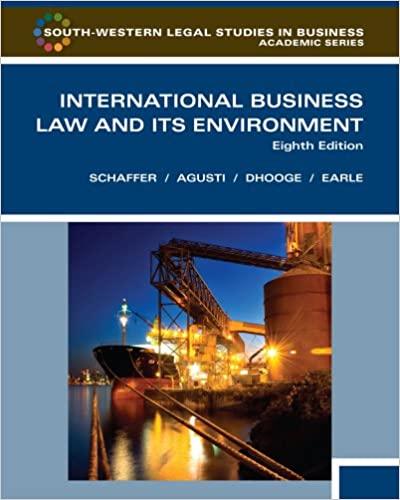Question
Assignment 3 DAA6C #2 2. Which of the following is a FALSE statement about how laws are passed by Congress? a. A bill is always
Assignment 3 DAA6C #2
2. Which of the following is a FALSE statement about how laws are passed by Congress?
a. A bill is always introduced first in the House of Representatives and then, if passed there, it proceeds to the Senate. b. If a bill is not passed during the current session of Congress it expires, and must be introduced as a new bill in the succeeding Congress in order to be considered. c. After a bill has been passed the appropriate term for it is "an act". d. A bill is the most common avenue to introduce legislation.
3. Your reading material mentions three tests used to determine criminal insanity. Which of the following is NOT one of these?
a. irresistible impulse test b. M'Naghten test c. temporary insanity test d. Model Penal Code
5. Stealing out of necessity would be considered a/an __________ defense. a. excuse b. self-defense c. justification d. none of the above
7. Which of the following is a FALSE statement about the use of deadly force? a. Before you are entitled to use deadly force in self-defense you must attempt to retreat from the encounter by giving as much ground as possible. b. You are not obliged to retreat from your home or place of work unless you are the initial aggressor. c. Police officers are not required to retreat when performing their lawful duties. d. Deadly force is permissible as a defense against all forms of attack.
9. Under what circumstance can a person use deadly force to protect property against an attempt to steal it? a. whenever the property the thief is attempting to steal is in one's possession b. when the intruder poses a substantial risk to those inside a dwelling that is being burglarized c. when recovering an object that has just been stolen d. all of the above
17. There is no statute of limitations with regard to __________. a. civil actions b. murder c. petty criminal offences d. none of the above - there is always a statute of limitations
19. Consent may be a defense against a charge of __________. a. battery b. statutory rape c. larceny d. all of the above
Step by Step Solution
There are 3 Steps involved in it
Step: 1

Get Instant Access to Expert-Tailored Solutions
See step-by-step solutions with expert insights and AI powered tools for academic success
Step: 2

Step: 3

Ace Your Homework with AI
Get the answers you need in no time with our AI-driven, step-by-step assistance
Get Started


